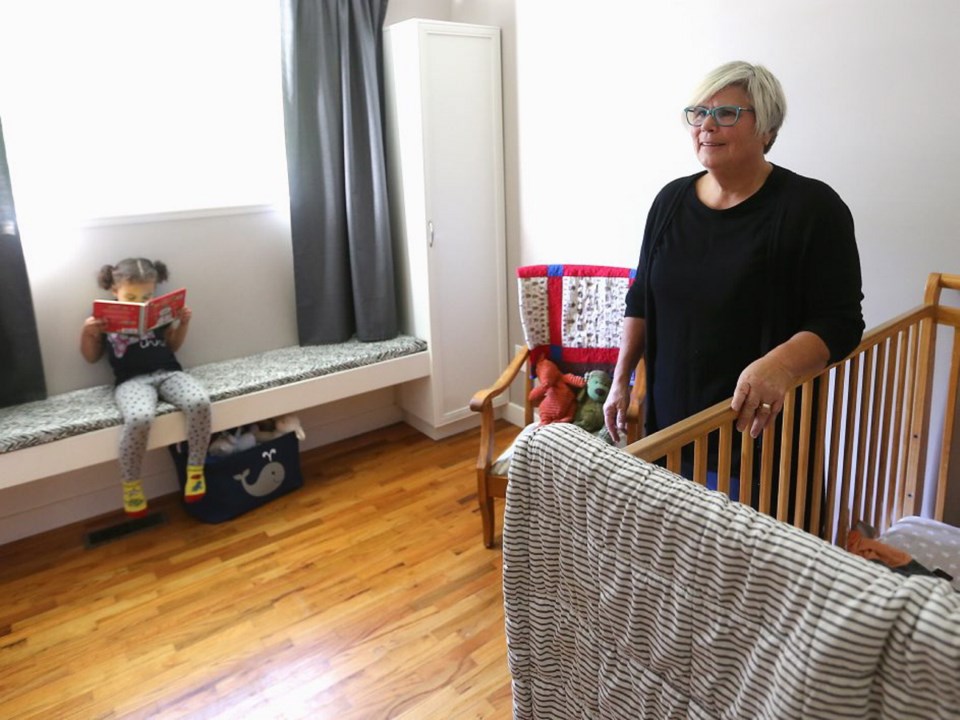It was a friend who suggested that Sandy Case give foster parenting a try.
They signed up together, went through the screening process, got accepted. Case already had plenty to do with two little children of her own at the time and a husband who was often away at sea with the navy.
But she wanted to do something to help others and, nearly 25 years later, she’s still welcoming children into her home.
Over that time, Case figures she and her husband have fostered about 125 children, some for a weekend, others for months or years at a time.
In that, she’s hardly alone. There are about 2,425 family-based foster homes in B.C. and Case says many of them have been at it far longer than she has.
“It’s like a calling,” she says. “It really is. Right here in Victoria, there’s lots of foster parents that have been doing it longer than me and they’re all amazing and wonderful.”
If pressed, Case says her passion for fostering likely stems from a belief in volunteering and giving back to the community.
At its root, that’s what being a foster parent is all about, she says.
“I always say that to be a foster parent, you have to be a professional caregiver, but you have to have the heart of a volunteer,” she says. “You have to care about your community. You have to care about mankind.
“We’re just trying to help out where we can.”
It’s a message to which Case keeps returning during an interview to mark Foster Family Month in B.C.
“The goal is always to keep these families together,” she said. “You know, in the eyes of the world, we’re either saints or sinners. We’d really like people to understand we’re trying to help these families when they’re in need. The ministry and the other agencies responsible for children are all just trying to get the kids home.”
In more than two decades as a foster parent, Case said she’s witnessed the Ministry of Children and Family Development make significant strides working with families, as well as finding and supporting extended families to care for children and youth so that they don’t remain in the child welfare system.
The ministry reports that as of Aug. 31, 2019, there were 2,928 Indigenous and 1,241 non-Indigenous children and youth in foster care in B.C., and that there are fewer Indigenous youth in care than at any time since 2014.
Although fewer children are coming into care now than in the past, Case said there’s always a need for more foster parents, especially those from diverse backgrounds, to provide care when it’s needed.
“In a perfect world, it would be nice if the social workers had a whole pool of people to choose from so that they could match the child with a family better,” she said. “That’s the goal. The goal is to recruit more foster parent caregivers so that they do have better options for the children.”
That’s not always the case now, she says. “Sometimes they just have to take whoever has an empty bed and is able to do the job.”
Case acknowledges that it can be difficult work that requires constant training to help traumatized children or those with a range of special needs.
As well, there’s the challenge of parting with children and youth who become part of the family,
“We’re in their lives for as short or as long as we’re needed,” says Case, president of the Vancouver Island (South) Foster Parent Association. “We always know that it’s temporary and it’s not forever and we know that going into it.
“But, saying that, they have to become part of our family while they’re staying here. They’re not guests in our home.”
Case said she was a “wreck” the first time children left her home. “And I still am. But I know what to expect now, so my family and I prepare ourselves for it.”
The ministry, too, assists with planning gradual transitions so as prevent further trauma to the children, Case said.
“When they leave, they’re conflicted,” she said. “So it’s my job to make sure that they go with a full heart and that they are accepting of the change.”
In some cases, foster parents continue to assist after the children return home by providing respite care and ongoing support.
“The hope really is that, in some small way, that something that we did will help them in their time of need,” she said.
For more information on becoming a foster parent, visit https://fosternow.gov.bc.ca/



